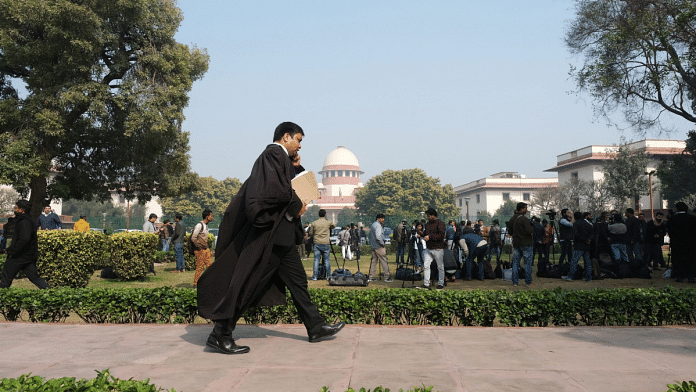New Delhi: The Supreme Court Tuesday ordered that no prosecution against an MP or an MLA shall be withdrawn without the permission of the high courts which are monitoring the progress of cases pending against such elected lawmakers.
A three-judge bench led by Chief Justice of India N.V. Ramana issued the directions after instances of the proposed withdrawal of cases against members of legislative assemblies belonging to the ruling party of that state were highlighted.
Senior advocate Vijay Hansaria and lawyer Sneha Kalita had brought the matter to the court’s notice when the bench was hearing the speedy disposal of cases against elected representatives. The two are assisting the bench as amicus curiae in the matter.
The court also expressed displeasure over the Centre’s failure to follow its three prior orders, requiring the government to provide details of pending cases lodged by the Central Bureau of Investigation (CBI) and Enforcement Directorate (ED) against elected lawmakers.
“When we took this matter up, you (Centre) gave us a commitment that there will be speedy trial in such cases. But you have done nothing, we can only say this,” the three-judge bench observed. The CJI also read out the three orders issued in September, October and November last year to stress upon his point.
While the ED had submitted the list Monday night, the CBI did not do so, prompting the bench to make the comments.
On behalf of the Centre, Solicitor General Tushar Mehta clarified that there was no reluctance on the CBI’s part to furnish the list. “I agree we are lacking, but it is a case of lack of co-ordination and not reluctance,” he explained.
Also said: ‘Every game has element of chance’ — why Madras HC quashed TN law banning online rummy, poker
High courts to examine withdrawal of cases
The bench, in its order, said: “The high courts are requested to examine the withdrawal of cases against MP/MLAs since 16 September, 2020, in reference to the Supreme Court judgment in State of Kerala versus K Ajith.”
Usually, the trial court takes a decision on a withdrawal application that is moved by the prosecuting agency. However, with the top court order, now the magistrates have been refrained from taking a decision on the withdrawal of prosecution.
In the K. Ajith case, the top court had rejected the Kerala government’s appeal to let it withdraw criminal cases against leaders belonging to the ruling Left Democratic Front (LDF) government, while laying down guidelines for courts to decide applications for withdrawal. The apex court ruled that the withdrawal of cases should be permitted only if it is in public interest.
The leaders in the case are charged with the destruction of public property for resorting to violence during an assembly session in 2015.
The top court’s order on withdrawal of cases came after amicus curiae Hansaria and Kalita highlighted in their latest report instances of proposed withdrawal of cases against members of ruling party.
According to the report, the Karnataka government in August 2020 issued instructions for the withdrawal of 61 cases against elected representatives of the state legislature. However, no further action was taken due to a high court order in a PIL that directed no steps shall be taken on the basis of the notification.
The Uttarakhand government similarly also moved an application for withdrawal of prosecution against sitting MLA Rajkumar Thukral, accused in a murder case registered in 2012. The application is still pending before the trial court.
Quoting newspaper reports, Hansaria noted that the Uttar Pradesh government also proposes to withdraw cases against some of its MLAs who were booked for giving inflammatory statements against a community during the Muzaffarnagar riots, in which 65 people were killed and around 40,000 were displaced.
No transfers of trial court judges hearing such cases
The top court also noted that the decision to install video-conference facilities in trial courts was still pending. In its last November order, the bench had asked the Centre and states to allocate funds for the facility.
On being informed there was no movement on this front, the bench told Mehta that the Centre had failed to “even answer” on this aspect. It then went on to direct the central government to file an affidavit in this regard before the next date of hearing on 25 August.
The court further directed the registrar generals of all high courts to submit a chart of trial court judges hearing criminal cases against elected lawmakers, cases pending and cases disposed of by them.
On Hansaria’s suggestion that the trial judge hearing these cases should not be transferred for at least two years, the apex court said such judges shall continue to be at their post until further orders — unless a judge is due to retire. In that case, the high court will look into the individual cases, the court said.
(Edited by Paramita Ghosh)
Also read: SC asks states about security for judicial officers, terms threatening incidents as ‘serious’



